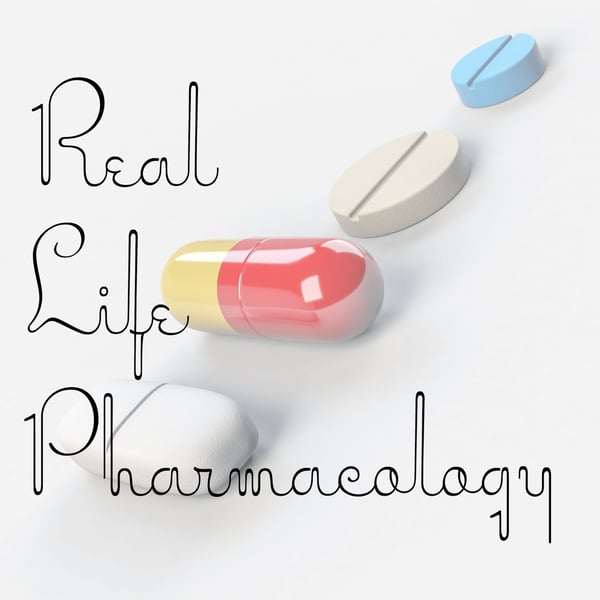NSAID Drug Interactions
Real Life Pharmacology - Pharmacology Education for Health Care Professionals
Eric Christianson, PharmD; Pharmacology Expert and Clinical Pharmacist
5 • 716 Ratings
🗓️ 3 July 2025
⏱️ 16 minutes
🧾️ Download transcript
Summary
Combining NSAIDs with anticoagulants or antiplatelet agents like warfarin or aspirin significantly increases the risk of gastrointestinal bleeding, due to additive effects on platelet inhibition and mucosal irritation.
NSAIDs can elevate lithium levels and increase the risk of toxicity, as they reduce renal clearance of lithium by decreasing renal perfusion.
Co-administration of NSAIDs with methotrexate can impair methotrexate elimination, leading to elevated levels and potential toxicity, especially at high methotrexate doses.
When NSAIDs are used with corticosteroids, the risk of gastrointestinal ulcers and bleeding is greatly amplified due to synergistic impairment of gastric mucosal protection.
Transcript
Click on a timestamp to play from that location
| 0:00.0 | Hey, all, welcome back to the Real Life Pharmacology podcast. |
| 0:03.3 | I'm your host, pharmacist Sarah Christensen. |
| 0:05.0 | Thank you so much for listening today. |
| 0:07.3 | So always go check out real life pharmacology.com. |
| 0:10.5 | We've got your free 31-page PDF on the top 200 medications. |
| 0:15.7 | Absolutely a no-brainer to have. |
| 0:17.1 | If you're out in practice, if you're going through pharmacology classes in school, |
| 0:21.4 | a great little refresher and or study guide that can help you learn pharmacology a little bit |
| 0:28.1 | better. |
| 0:28.5 | So go take advantage of that at real-life pharmacology.com. |
| 0:33.3 | All right, mixing it up a little bit today by request, we are going to take a deep dive |
| 0:38.9 | into insed drug interactions. |
| 0:42.9 | So non-steroidal anti-inflammatory drugs, common medications include ibuprofen, neprofen, |
| 0:50.5 | dichlofenac, and so on. |
| 0:52.1 | There are lots of different insides. |
| 0:56.0 | I want to talk about some of the most important drug interactions you're going to see because let's face it, these medications are used |
| 1:00.9 | very frequently, especially when you consider the fact that, you know, a couple are over the |
| 1:07.0 | counter. We've got ibuprofen. We've got naproxin. Patients can pick these up, not |
| 1:11.7 | recognize, not understand that there can be significant consequences and interactions if we take |
| 1:18.8 | these medications with other medications. So I'm going to highlight some of the most important things |
| 1:24.4 | here that you should pay attention to and things that I've seen in |
| 1:28.6 | practice. So first and foremost, hypertension is obviously a really, really common |
... |
Please login to see the full transcript.
Disclaimer: The podcast and artwork embedded on this page are from Eric Christianson, PharmD; Pharmacology Expert and Clinical Pharmacist, and are the property of its owner and not affiliated with or endorsed by Tapesearch.
Generated transcripts are the property of Eric Christianson, PharmD; Pharmacology Expert and Clinical Pharmacist and are distributed freely under the Fair Use doctrine. Transcripts generated by Tapesearch are not guaranteed to be accurate.
Copyright © Tapesearch 2025.

